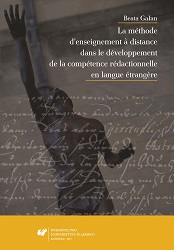La méthode d’enseignement à distance dans le développement de la compétence rédactionnelle en langue étrangère
The Distance Learning Method in the Development of Competencies in Foreign Language Writing
Author(s): Beata Gałan
Subject(s): Language studies, Language and Literature Studies, Theoretical Linguistics, Philology
Published by: Wydawnictwo Uniwersytetu Śląskiego
Keywords: distance learning method; information and communication technologies (ICT); learning strategies; language competencies
Summary/Abstract: The subject of this work is a reflection on the effectiveness of the distance learning method in the glottodidactic process. The author concentrates upon: an analysis of properties of the remote method basing on various forms of distance learning, an overview of information and communication technologies (ICT) used in education, a reflection on the editing process in a foreign language, and a discussion about didactic and social aspects of an educational virtual space (a virtual classroom). On the grounds of theoretical considerations, empirical studies were conducted; their main purpose was an observation of properties and an evaluation of the efficiency of the distance learning method in developing competencies in foreign language writing. In the studies, the hybrid approach – combining quantitative and qualitative analyses –was utilised. In order to verify the effectiveness of the distance learning method, a didactic experiment was carried out, which made it possible to compare the results achieved in the traditional system and in the virtual space. The quantitative analysis was supplemented with a number of reflections on the specificity of the distance learning method and the virtual classroom.Consisting of the pilot study and the main study, the experiment was conducted within the framework of higher education, in a composition course included in the “Practical knowledge of French” module. One group of students starting to learn French as an at least second foreign language participated in the experiment. The aim of the study was to examine the influence of the distance learning method on the development of writing skills in a foreign language. In order to compare the educational effects, a half of the classes in the course were conducted in a classic form, and another half – in the remote learning system by means of the Moodle learning platform. Non-final grades (ones received in the course during the term) became the research material necessary to compare the results, and the obtained data were subject to statistical processing. The pilot study brought comparable results of average grades, but it also provided valuable guidelines concerning the untypical dispersion of the results. In the main study, conducted on 47 people, an ordinary comparison of average grades also suggested a similar efficiency of both methods. However, the study of significance of the differences by means of the t test revealed that the online method proves to be more effectivein a statistically relevant manner, but it brings measurable benefits only to a specific target group, using adequate learning strategies.Additional information was provided by the qualitative analysis. It demonstrated that – despite rather frequent and regular Internet usage, also for educational purposes — students’ attitude to distance learning is relatively varied. Student point to both advantages and opportunities offered by the distance learning method (development of autonomy and learning strategies, access to various didactic materials), and its limitations (lack of direct contact with the teacher, lowered motivation). The interviewees’ responses clearly emphasise not only the differences between the classic method and the distance learning method, but also the specificity of working in a remote system, which requires a huge amount of self-discipline, regularity, and involvement. The key to success in the distance learning process is a set of competencies and skills related to learning strategies (high level of autonomy, self-discipline, autonomy in problem solving, conscious time management, regularity). Such a set is defined in the work as the habitus of the virtual classroom.An evaluation of the effectiveness of the distance learning method is an obvious priority of academic teachers in the light of virtualisation of higher education. The conducted research provided significant information concerning the efficiency and specificity of the distance learning method, which will make it possible to use this method in a more conscious manner in the practice of academic teaching. However, the classic method still remains the privileged one, and the teacher–student relation — a relevant feature of this kind of teaching practice. Nevertheless, the potential of the distance learning method turns out to be significant. The optimal solution is, certainly, the hybrid method, combining direct contact with distance learning elements. To sum up, the main conclusion emerging from the conducted study is that the distance learning method proves to be effective only to a certain target group, members of which use learning strategies that are appropriate to this type of work.
Series: Pedagogika, Dydaktyka
- E-ISBN-13: 978-83-226-3213-0
- Print-ISBN-13: 978-83-226-3212-3
- Page Count: 278
- Publication Year: 2017
- Language: French
- eBook-PDF
- Sample-PDF
- Table of Content
- Introduction

